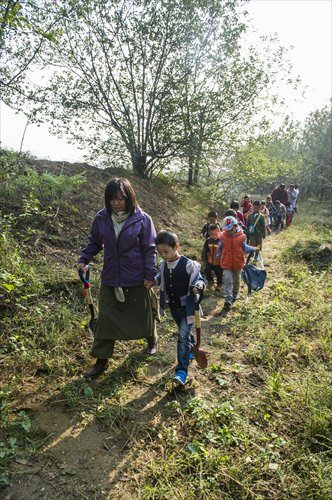

Preschool students at the school on their way to an organic farm not far from the school grounds. Photo: Li Hao/GT
According to Yu, most of the teachers at the school are certified by approved Waldorf education training centers: Wang received his master's degree in Waldorf pedagogy from Freie Hochschule Stuttgart (Waldorf Teachers College) in Germany; and Yu has more than a decade of experience teaching at Waldorf schools in the US. However, the school is not on the Waldorf World List 2014, a directory of certified schools published by the official international Waldorf sanctioning body.
Integrated learning
One of the unique features of Waldorf education is that subjects are taught in a way that is integrated, rather than as separate fields of knowledge with disparate concerns. Instead of dividing learning units into discrete subjects like history or mathematics, each subject will be integrated through a common topic, said Yu.
For example, if the topic is "architecture," students will be instructed to approach it from multiple disciplines, from mathematics (measurement and geometry), to history (how houses have changed over time), to literacy (a myth or fairy tale about houses). These topics are taught in blocks of several weeks at a time, and are called "main lessons."
"For the math component [of this main lesson], I teach them about measurement, as part of building a house. Afterwards, the children build their own model houses, which is great fun for them," Wang added.
For each main lesson topic, a hands-on approach is adopted. "For example, [one of the main lesson topics] is farming. So our students make their own biodynamic farm," said Yu.
Yu added that teacher acts as a role model and a guide, rather than strictly as an authority figure, and collaboration is encouraged over competition. Learning outcomes are evaluated through portfolio work, personal reports, and discussions between teachers, parents and students, rather than through exams or competitive grades.
Looking towards the future
According to the Waldorf World List 2014, there are currently 1,039 certified Waldorf schools around the world.
"Since the first Waldorf school was established in Germany in 1919, Waldorf education has become one of the largest independent alternative education movements in the world," said Huang Xiaoxing, who co-founded China's first Waldorf school in Chengdu, Sichuan Province in 2004.
Huang identified three main obstacles impeding Waldorf's growth in China. The first was the lack of qualified Waldorf teachers in the country, and the second was the lack of government support. Finally, said Huang, Waldorf schools still lack legitimacy in China. Of the over 300 Waldorf schools that Huang estimates are in China, only six are certified on the Waldorf World List 2014.
With the concern that unqualified education staff will influence the development of Waldorf education in China, Huang and other Waldorf educators are taking steps to tackle the challenges. In lieu of official accreditation, and to promote wider acceptance for Waldorf education in China, Huang is hosting a series of workshops and classes for parents and teachers to maintain the standards of Waldorf education in the country.
This March, the Spring Valley Waldorf School partnered with the University of Modern Administration in Beijing to found Spring Valley College, an institution that will train teachers in the Waldorf system.
In addition, Spring Valley Waldorf School, which is affiliated with the Beijing Bowen School in Fangshan district to allow it to operate legally as a school under China's laws, hopes to expand beyond simply being an elementary school in coming years.
"In the future, students will be able to take the gaokao (the national college entrance examinations) or other exams to be admitted entry into higher education," said Yu.
"In this way, students can apply for both the universities home and abroad."
But Chu Zhaohui, professor at the National Institute of Education Sciences, advised parents to be cautious about sending their children to Waldorf schools if they want their children to enter a first-class university.
"Students graduating from Waldorf schools will find it very hard to get admitted into a top university in China because students can not transfer from such way of education to exam-oriented education in a short time," said Chu. "However, some children who are suited to the Waldorf approach will be able to nurture their talents and realize their worth after they enter society."
"People should be tolerant of diverse ways of education rather than only traditional routes. Waldorf education is one of many approaches, which might yield results for certain students," Chu said.
Asian students drive US education reform
2014-09-25Chinese education in eyes of US teachers
2014-09-16Govt vows to work toward equality in education
2014-09-05Importance of physical education
2014-08-05Copyright ©1999-2018
Chinanews.com. All rights reserved.
Reproduction in whole or in part without permission is prohibited.